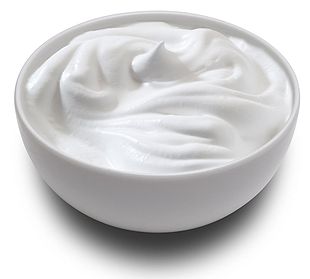Yogurt
From Wikiwel
Other Names: Acidophilus Milk, Bulgarian Yogurt, Cultured Milk, Lait Acidophilus, Lait de Culture, Live Culture Yogurt, Probiotic, Probiotique, Yaourt, Yaourt Bulgare, Yaourt de Culture Vivante, Yoghurt, Yogourt, Yogourt Bulgare, Yogourt de Culture Vivante, Yogur. See also :
By adding bacterial cultures to milk and fermenting them, yogurt is produced. The tart flavor and pudding-like texture is due to the breakdown of lactose of milk into lactic acid.
Special Precautions of Yogurt
- Yogurt is LIKELY SAFE for most adults when taken by mouth. Yogurt is POSSIBLY SAFE when used in the vagina. There aren't many reported side effects, but there have been cases of people getting sick from yogurt contaminated with disease-causing bacteria. Be careful to choose yogurt that has been prepared and stored properly.
- Pregnancy and breast-feeding: Yogurt seems to be safe in food amounts and might be safe when applied intravaginally during pregnancy. Pregnant women involved in a small study reported no side effects.
- Yogurt seems to be safe in breast-feeding women when used in normal food amounts, but researchers haven’t adequately studied the safety of intravaginal use of yogurt during breast-feeding. It’s best to avoid intravaginal use if you are nursing.
- Weakened immune system: There is some concern live bacteria in yogurt might reproduce unchecked, causing illness in people with weakened immune systems, such as people with HIV/AIDS or organ transplant recipients. Lactobacillus in yogurt has caused disease, but rarely, in people with weakened immune systems. To be on the safe side, if you have a weakened immune system, avoid eating large amounts of yogurt that contain live bacteria for prolonged periods of time without advice from your healthcare professional.
- Antibiotics (Tetracycline antibiotics) interacts with YOGURT
- Ciprofloxacin (Cipro) interacts with YOGURT
- Medications that decrease the immune system (Immunosuppressants) interacts with YOGURT
The benefits of Yogurt are
The lactic acid bacteria, such as the Lactobacillus casei, actually give several health benefits to an individual.
- Diarrhea in children. Yogurt formula given as a replacement for milk formula in infants and young children seems to relieve persistent diarrhea.
- Diarrhea associated with antibiotics.
- Preventing vaginal yeast infections.
- Lactose intolerance, as an alternative to milk. Eating yogurt with live bacterial cultures seems to improve lactose tolerance in children and adults who cannot absorb lactose.
- Treating a bacterial infection that can cause stomach ulcers (Helicobacter pylori), when used in combination with other medicines. The standard “triple-drug therapy” for stomach ulcers caused by Helicobacter pylori (H. pylori) infection involves treatment with lansoprazole (Prevacid), amoxicillin (Amoxil, others), and clarithromycin (Biaxin). Adding yogurt that contains lactobacillus or bifidobacterium to standard triple drug treatment seems to help patients stick to their treatment plan. This makes the treatment more effective in killing the H. pylori bacteria. However, consuming yogurt alone without standard triple-drug therapy does not appear to kill H. pylori.
- High cholesterol levels. Taking yogurt that contains Lactobacillus acidophilus and a combination of Enterococcus faecium and Streptococcus thermophilus seems to decrease cholesterol in patients with borderline to moderate high cholesterol levels. This type of yogurt seems to lower total and “bad” low-density lipoprotein (LDL) cholesterol but does not raise “good” high-density lipoprotein (HDL) cholesterol.
- Cold and flu : When taking yogurt in a regular basis, you are strengthening the arsenal that protects your body from invasive diseases. Probiotic yogurts can stimulate immunity at the cellular level. Cellular immunity is our body’s first line of defense against viruses, parasites and yeasts. Studies showed that those who are taking their daily cup of either probiotic or conventional yogurt are more likely protected from respiratory disease causing microorganisms, such as influenza and common colds, than those who do not have them in their diet.
- cancer : Yogurt is also used for preventing colorectal cancer and sunburns
